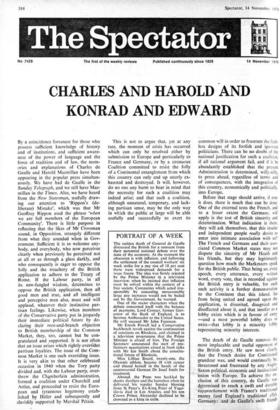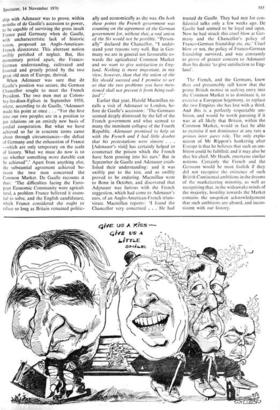CHARLES AND HAROLD AND KONRAD AND EDWARD
By a coincidence fortunate for those who possess sufficient knowledge of history and of institutions, and sufficient aware- ness of the power of language and the force of tradition and of law, the mem- ories and explanations of Charles de Gaulle and Harold Macmillan have been appearing in the popular press simultan- eously. We have had de Gaulle in the Sunday Telegraph, and we still have Mac- millan in the Times. Also, we have heard from the New Statesman, usefully draw- ing our attention to `Rippon's (de- liberate) Mistake', which was that Mr Geoffrey Rippon used the phrase 'when we are full members of the European Community'. There is little purpose in reflecting that the likes of Mr Crossman sound, in Opposition, strangely different from what they sounded when in Gov- ernment. Sufficient it is to welcome any- body, and everybody, who now perceives clearly when previously he perceived not at all or as through a glass darkly, and who consequently is eager to oppose the folly and the treachery of the British application to adhere to the Treaty of Rome. If the Labour party, in all its new-fangled wisdom, determines to oppose the British application; then all good men and true, and all intelligent and perceptive men also, must and will applaud, whatever their instinctive par- tisan feelings. Likewise, when members of the Conservative party put in jeopardy their immediate political future by de- claring their root-and-branch objection to British membership of the Common Market, they, too, cannot but be con- gratulated and supported. It is not often that an issue arises which rightly overrides partisan loyalties. The issue of the Com- mon Market is one such overriding issue. It is very aim to that other celebrated occasion in 1940 when the Tory party divided and, with the Labour party, over- threw the Chamberlain administration, formed a coalition under Churchill and Attlee, and proceeded to resist the Euro- pean and tyrannous hegemony estab- lished by Hitler and subsequently and slavishly supported by Marshal Petain. This is not to argue that, yet at any rate, the moment of crisis has occurred which can only be resolved either by submission to Europe and particularly to France and Germany, or by a strenuous Coalition committed to resist the folly of a Continental entanglement from which this country can only end up utterly ex- hausted and destroyed. It will, however, do no one any harm to bear in mind that the necessity for such a coalition may indeed arise; and that such a coalition, although unnatural, temporary, and lack- ing partisan sense, may be the only way in which the public at large will be able usefully and successfully to exert its common will in order to frustrate the feck- less designs of its foolish and ignorant politicians. There can be no doubt of the national justification for such a coalition, if all rational argument fail, and if it be abundantly established that the present Administration is determined, willy-nilly, to press ahead, regardless of terms and of consequences, with the integration of this country, economically and politically, into Europe.
Before that stage should arrive, if ever it does, there is much that can be done. One of the external tests the French, and to a lesser extent the Germans, will apply is the test of British sincerity and determination. What indication is there, they will ask themselves, that this insular and independent people really desire to enter into intimate association with us? The French and Germans and their asso- ciated Common Market states may not dispute the sincerity of Mr Heath and his friends, but they may legitimately question how much the Marketeers speak for the British public. That being so, every speech, every utterance, every written word, every vote, that is recorded against the British entry is valuable, for each such activity is a further demonstration to the Continent that this island, far- from being united and agreed upon the application, is disunited, disagreed and disaffected about it, and that insofar as a lobby exists which is in favour of entry —and a most powerful lobby does so exist—that lobby is a minority lobby representing minority interests.
The death of de Gaulle removes the most implacable and useful opponent of the British entry. He saw most clearly that the French desire for Continental grandeur was, and would continually be, threatened and frustrated by any Anglo- Saxon political, economic and institutional union with Europe. To achieve the ex• dusion of this country, de Gaulle was determined to reach a swift and durable rapprochement with France's traditional enemy (and England's traditional ally), Germany: and de Gaulle's swift friend' ship with Adenauer was to prove, within months of de Gaulle's accession to power, to be capable of surviving the gross insult France paid Germany when de Gaulle, with uncharacteristic lack of historic vision, proposed an Anglo-American- French directorate. This aberrant notion swiftly perished of neglect. But, this momentary period apart, the Franco- German understanding, cultivated and fostered and greatly prized by the two great old men of Europe. thrived. When Adenauer was sure that de Gaulle's position was secure, the German Chancellor sought to meet the French President. The two men met at Colom- bey-les-deux-Eglises in September 1958, where, according to de Gaulle, 'Adenauer made his point at once. . . "For the first time our two peoples are in a position to put relations on an entirely new basis of cordial cooperation. But what we have achieved so far in concrete terms came about through circumstances—the defeat of Germany and the exhaustion of France —which are only temporary on the scale of history. What we must do now is to see whether something more durable can be achieved".' Apart from anything else, the substantial agreement achieved be- tween the two men concerned the Common Market. De Gaulle recounts it thus: 'The difficulties facing the Euro- pean Economic Community were agricul- tural, a problem France believed it essen- tial to solve, and the English candidature, which France considered she ought to refuse so long as Britain remained politic- ally and economically as she was. On both these points the French government was counting on the agreement of the German government for, without that, a real union of the Six would not be possible. "Person- ally" declared the Chancellor, "I under- stand your reasons very well. But in Ger- many we are in general not favourable to- wards the agricultural Common Market and we want to give satisfaction to Eng- land. Nothing is more important, in my view, however, than that the union of the Six should succeed and I promise to act so that the two problems you have men- tioned shall not prevent it from being real- ised"? - Earlier that year, Harold Macmillan re- calls a visit of Adenauer to London, be- fore de Gaulle's accession: 'The Germans seemed deeply distressed by the fall of the French government and what seemed to many the imminent collapse of the Fourth Republic. Adenauer promised to help us with the French and I had little doubts that his protestations were sincere . . . [Adenauer's visit] has certainly helped to counteract the poison which the French have been pouring into his ears.' But in September de Gaulle and Adenauer estab- lished their understanding: and it was swiftly put to the test, and as swiftly proved to be enduring. Macmillan went to Bonn in October, and discovered that Adenauer was furious with the French suggestion. which had come to Adenauer's ears, of an Anglo-American-French trium- virate. Macmillan reports: 'I found the Chancellor very concerned . . . He had trusted de Gaulle. They had met for con- fidential talks only a few weeks ago. De Gaulle had seemed to be loyal and open. Now he had struck this cruel blow at Ger- many and the Chancellor's policy of Franco-German friendship etc. etc.' Cruel blow or not, the policy of Franco-German friendship survived, and was constantly to prove of greater concern to Adenauer than his desire 'to give satisfaction to Eng- land'.
The French, and the Germans, knew then and presumably still know that the prime British motive in seeking entry into the Common Market is to dominate it, to exercise a European hegemony. to replace the two Empires she has lost with a third. And this is a perfectly respectable am- bition, and would be worth pursuing if it was at all likely that Britain. within the Common Market. would in fact be able to exercise if not dominance at any rate a primus inter pares role. The only expla- nation of Mr Rippon's hankering after Europe is that he believes that such an am- bition could be fulfilled; and it may also be that his chief. Mr Heath, entertains similar notions. Certainly the French and the Germans would be most foolish if they did not recognise the existence of such British Continental ambitions in the dreams of the marketecring minority, as well as recognising that, in the wideawake minds of the majority, hostility towards the Market contains the unspoken acknowledgement that such ambitions are absurd, and incon- sistent with our history.









































 Previous page
Previous page